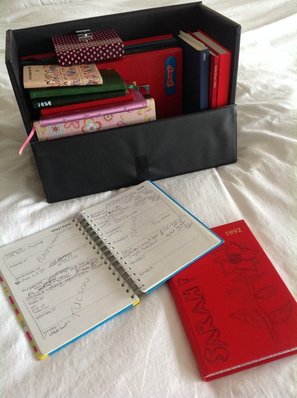|
New year, new regime January is a good time to get organised, so one of my resolutions this year is to keep a proper work diary. Although I've always been an organised person (I'm an avid list-maker and diary-keeper) I only started my business nine months ago, and I’ve spent a lot of that time finding my feet. So, although I did make plans and lists, it was all rather random – on whichever piece of paper was closest, or as a memo on my phone. It worked, but, for what will be my first full year in business, I'm determined to do better and pick up tried-and-tested old habits again. This has given me a chance to reflect on how I’ve used diaries in the past and the impact it’s had on my life – and I'm hoping that this reflection will help me come up with the most efficient method of journaling for my business. Step back in time The first year I kept a diary was 1983 – the year I turned ten. It was all very simple in those days ... Played with so-and-so after school ... and the like. In subsequent years my diaries became filled with teen angst and the minutest details about what my latest crush had been up to. There was some indication of my organisational skills in that I always kept a separate calendar diary. I also included useful information in my regular diary, such as what I’d had for tea and a daily weather report – surprisingly fascinating when you look back. Some years I gave each day a mark out of ten, then an overall score for each week. The first year I combined my personal diary with my calendar diary and to-do lists was 1992 – the year I was at college doing A-levels. In those days I had all the time in the world to plan – and to dream. As a result, that diary was full of doodles from cover to cover (flowers and geometric shapes, mostly). There was an area for notes at the end of each week and there I added my to-do lists, hopes, dreams, more doodles, and favourite poems and song lyrics. Often the to-do list was carried forward to the following week. Okay, so I was trying to be organised, but I confess I lacked motivation and I procrastinated. A lot. I was the kind of teenager who would spend so much time planning my exam-revision timetable that I would run out of time to actually revise.
Old habits died a death
I successfully kept detailed diaries for a few more years after my return home, but then motherhood got in the way and smartphones eventually took on the job of keeping my calendar and to-do lists. However, now that I'm back behind a desk, I want to return to paper. It's a more permanent, reliable method – many a phone has died on me, but I still have all my old paper diaries. I work from home, so I don't have to worry about it being easily portable. Back to the future I’d already purchased a wall-mounted year planner and marked it up to show when I have work booked in, when I am unavailable for work, and important dates, such as meetings, so that I can respond quickly when I get a call or an email from a client asking if I'm available. But what about a desk diary for the day-to-day notes and reminders? Bullet journals I did buy a week-to-view diary, but then I started hearing good things about bullet journals. I had no idea what a bullet journal was, so I did some Googling and up popped this Buzzfeed article. So, I thought I'd give it a go. I've used most of the ideas from the article for the skeleton of my journal, but for the main body – what I do from week to week – I’m following the method that worked best for me in the past: a week to a page, with the days of the week listed and a section for notes underneath. I'm going to resist the urge to buy lots of expensive, colourful pens and spend hours doodling to make my journal look pretty; I don't have the spare time that I had back in 1992, unfortunately. So, instead, I've just chosen a notepad that already has a flowery cover – smart thinking, see! I'm going to stay focused and use my time more wisely – which is the whole point of this endeavour, isn't it? Less dreaming, more planning and more achieving. What I’ve learned There are lots of ways to keep a diary/journal. It's good to get ideas from other people, but you need to find the way that works best for you and your lifestyle, otherwise you will lose interest and motivation. If you're not artistic, don't worry about trying to make the pages of your journal look pretty. Being motivated is the key factor. If you don’t enjoy your day-to-day life – whether hobbies, work or family life – then it will be near impossible to keep up the momentum required to stay organised. Figure out exactly what you want and slowly work towards it. Try to focus on what you have achieved and build on that. Let go of unrealistic ideas and expectations – for the time being at least. It was by first making changes in my everyday life (getting a better job and working on refurbishing my house) that I ended up being able to dramatically change my whole life for the better (ultimately, by following my dream of going travelling). Being organised in itself didn’t effect that change – motivation did that – but it was a way of ensuring that it all went smoothly. And so now I want to apply that to my business. I definitely have the motivation – I love my job and I’m working hard to be good at it and make a success of it – and being organised will help ensure that I don’t make mistakes or miss opportunities along the way. Confession This desire to take full control of my work life is partly fuelled by an inability to fully control my home life: my house is a mess, with toys all over the place (fortunately, my study has a lockable door). My dining room has been a shop for the past three weeks, reminiscent of Reggie Perrin's Grot Shop. So, if anyone knows how to convince a small child to stop making a mess, or perhaps tidy up occasionally, please let me know!
0 Comments
Your comment will be posted after it is approved.
Leave a Reply. |



